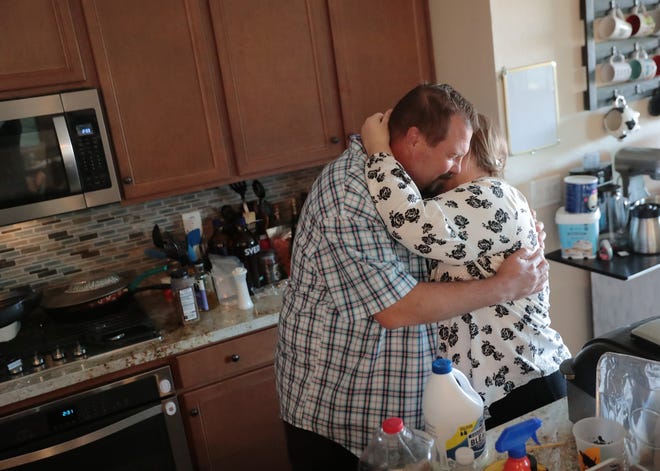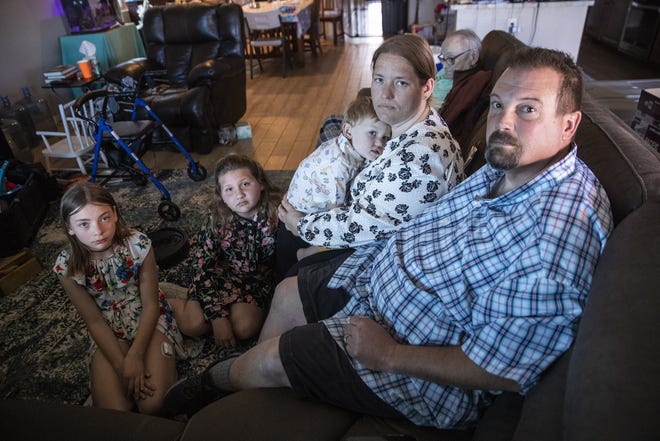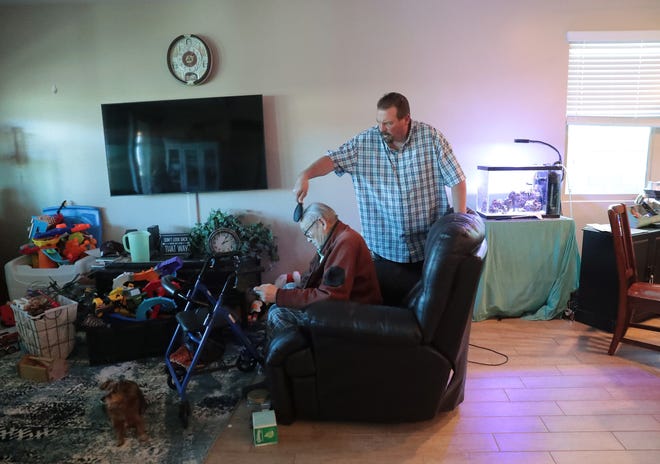'She needed the money': Family grieves loss of Phoenix flight attendant, 79, from COVID-19
Nearly a month after Phoenix-based American Airlines flight attendant Phyllis Adair lost her life to COVID-19, her son George and daughter-in-law Catherine are still making sense of their loss and navigating how her absence has upended their lives.
"It's the fact she's not around anymore," George Adair said, his voice shaking.
Phyllis is one of 500,000 Americans who have died from COVID-19 since it appeared in the United States in January 2020.
Just days after Phyllis died, her story was mentioned in a congressional subcommittee hearing as an example of the challenges facing flight attendants and airline employees as Congress considers passing another extension of the Paycheck Protection Program.
Her family, after reading coverage of the hearing, wanted to share why their 79-year-old mother was working during the pandemic.
"She flew 150 hours a month because she needed the money in order to be able to pay for her house and have assistance for the care of her husband," Catherine Adair told The Arizona Republic.
'She loved her job'
In 1997, the year George graduated from high school, Phyllis landed a job at America West Airlines in the reservations department. A couple years later, she became a flight attendant.
Over the years, the uniforms changed. America West became US Airways, which became American Airlines.
Through all the mergers, Phyllis kept working. George said a bad business decision by his father, Francis, left the couple without retirement savings, so she continued to work to support the household.
Plus, she loved to travel.
“She loved her job. She loved being a flight attendant,” George said.
When the coronavirus pandemic hit, Catherine said, her mother-in-law was very cautious because Francis has dementia and her granddaughter also has medical issues.
"Either of them getting this could kill them as well," Catherine said.
But, without enough saved to retire, Phyllis had to keep working to support herself and her husband.
“They have no savings or no retirement beyond Social Security,” Catherine said.
The last time George saw his mother well was on Christmas Eve, when the family went out to dinner together at a restaurant.
Christmas morning, Phyllis left on a flight for work.
On Dec. 28, George tested positive for COVID-19 and the family went into self-quarantine.
“So when she came home, I want to say the Monday after Christmas, we didn’t get to see her because we were afraid of exposing her to George being sick,” Catherine said.
Hard to pinpoint number of flight attendants exposed

Without reliable contact tracing, it's not known how Phyllis contracted the virus.
Airlines believe their planes to be safe, routinely pointing to studies like those demonstrating that aircraft filtration systems turn over the air every two to three minutes as evidence.
But many other aspects of air travel create the potential to be exposed to the novel coronavirus, especially for flight attendants who deal with hundreds of passengers a day.
Meanwhile, with wide community spread and little contact tracing in the United States, it's hard to pinpoint where an employee might have been exposed.
"I think the greatest balance for both American and for the labor unions for any airlines is balancing the wish for the return of travel demand with our safety," Paul Hartshorn Jr., communications chair with the Association of Professional Flight Attendants, said.
The APFA is the labor union representing the 24,000 American Airlines flight attendants at 11 crew bases across the United States.
Hartshorn said preventive measures the union has advocated for, like requiring masks onboard, better airplane cleaning and passing out hand sanitizer, have helped change the trajectory of cases among employees.
"Over the summer, it was a lot worse," Hartshorn said about airline workers contracting the virus. "It's trending with the rest of the country right now."
Phyllis falls ill with COVID-19

George and Catherine hadn't seen Phyllis since Dec. 24 as he recovered from the virus. During that time, Phyllis had two work trips.
On Jan. 11, Phyllis called George after she returned home early from a trip to Mexico City. She wasn’t feeling well. George said she told him she had to be taken off her flight in Miami with a wheelchair.
"I took her down to get a test," George said. "And we found out she had COVID."
He went to her house to check on her a couple days later and noticed that her lips looked a little blue. Phyllis refused to go to the hospital.
"At this point, George is like, 'You're going if I have to pick you up and walk you into the car.' So she finally conceded. She went to the hospital," Catherine said.
After several weeks in the hospital, which included time on a ventilator, Phyllis died on Feb. 2.
“American Airlines is deeply saddened by the passing of Phyllis Adair, a longtime flight attendant who was adored and respected across the airline. Our thoughts and prayers are with Phyllis’ family and loved ones during this difficult time,” American Airlines said in a statement to The Republic.
How the family is coping

While still grieving the loss of their matriarch, George and Catherine have become full-time caregivers to Francis.
It’s not an entirely unfamiliar role. The two cared for him part-time while Phyllis was away for work. But without Phyllis and her income, they can’t logistically or financially keep Francis in his house alone.
So, they’ve moved him into their two-story home in Buckeye.
As they figure out how to adapt their home to accommodate Francis, they’ve become part of a generation sandwiched between caring for a parent and raising their three children, ages 2 to 12.
Strained by this challenge, George aches for his daily phone call with his mom.
“I can’t do that anymore," he said through tears.
You can connect with Arizona Republic Consumer Travel Reporter Melissa Yeager through email at melissa.yeager@azcentral.com. You can also follow her on Twitter and Instagram.